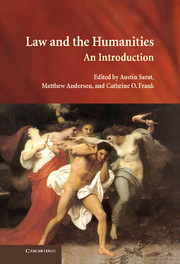Book contents
- Frontmatter
- Contents
- Contributors
- Acknowledgments
- Introduction: On the Origins and Prospects of the Humanistic Study of Law
- I PERSPECTIVES ON THE HISTORY AND SIGNIFICANCE OF SCHOLARSHIP IN LAW AND THE HUMANITIES: THREE VIEWS
- II IDEAS OF JUSTICE
- III IMAGINING THE LAW
- IV LINGUISTIC, LITERARY, AND CULTURAL PROCESSES IN LAW
- 12 Language
- 13 Interpretation
- 14 Narrative and Rhetoric
- 15 Justice as Translation
- 16 The Constitution of History and Memory
- V INSTITUTIONAL PROCESSES
- Index
- References
13 - Interpretation
Published online by Cambridge University Press: 20 January 2010
- Frontmatter
- Contents
- Contributors
- Acknowledgments
- Introduction: On the Origins and Prospects of the Humanistic Study of Law
- I PERSPECTIVES ON THE HISTORY AND SIGNIFICANCE OF SCHOLARSHIP IN LAW AND THE HUMANITIES: THREE VIEWS
- II IDEAS OF JUSTICE
- III IMAGINING THE LAW
- IV LINGUISTIC, LITERARY, AND CULTURAL PROCESSES IN LAW
- 12 Language
- 13 Interpretation
- 14 Narrative and Rhetoric
- 15 Justice as Translation
- 16 The Constitution of History and Memory
- V INSTITUTIONAL PROCESSES
- Index
- References
Summary
It is in fact the genius of law that it is not a set of “commands,” but a set of texts meant to be read across circumstances that are in principle incompletely foreseeable.…It is this fact that gives rise to the intellectual and ethical life of legal thought and argument. – James Boyd White
Interpretation is a ubiquitous feature of legal practice. Nevertheless, the relationship between law and interpretation is troubled. Simply put, legal actors find it difficult to acknowledge the centrality of interpretation given the manner in which the validity of the legal system is established. The traditional account of legal practice insists that lawyers read statutes and precedents to recover the meaning embedded in them and then apply these determinate meanings to the case at hand. Under this account, there generally is no need for “interpretation,” an activity that suggests that the law is ambiguous and requires the active participation of the lawyer or judge to render the law meaningful for the case at hand. This account is deemed necessary to underwrite the rule of law because it insists that preexisting legal rules are applied rather than fashioned in the course of the application.
Of course, even under this traditional account, interpretation is inevitable because individual laws sometimes are opaque and not easily applied, but this interpretive activity is regarded as a regrettable necessity that exists on the fringes of law's primary practice of unproblematic application.
- Type
- Chapter
- Information
- Law and the HumanitiesAn Introduction, pp. 339 - 376Publisher: Cambridge University PressPrint publication year: 2009
References
- 1
- Cited by



